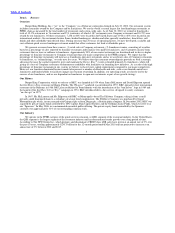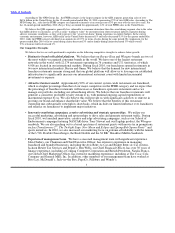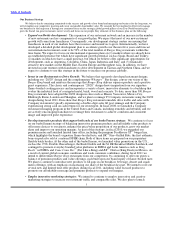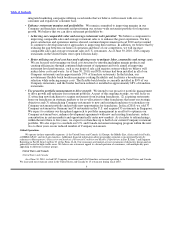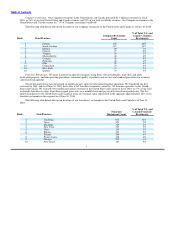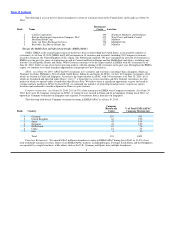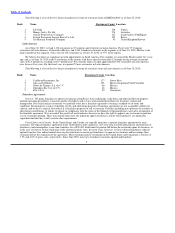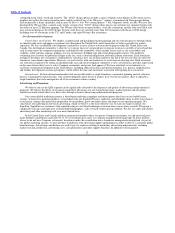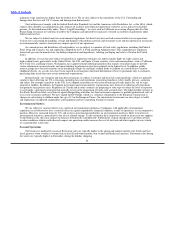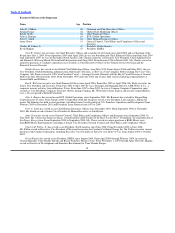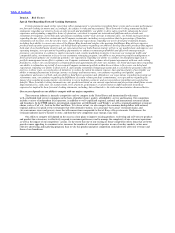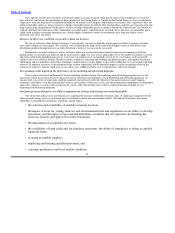Burger King 2010 Annual Report Download - page 15
Download and view the complete annual report
Please find page 15 of the 2010 Burger King annual report below. You can navigate through the pages in the report by either clicking on the pages listed below, or by using the keyword search tool below to find specific information within the annual report.
Table of Contents
advertising fund contributions, U.S. franchisees may elect to participate in certain local advertising campaigns at the Designated Market
Area (DMA) level by making contributions beyond those required for participation in the national advertising fund. Franchisees in
approximately 72% of the DMAs in the United States agreed to make this additional advertising contribution during fiscal 2010. We
believe that increasing the level of local advertising makes us more competitive in the FFHR category.
In the United States and in those other countries where we have Company restaurants, we coordinate the development, budgeting
and expenditures for all marketing programs, as well as the allocation of advertising and media contributions, among national, regional
and local markets, subject in the United States to minimum expenditure requirements for media costs and certain restrictions as to new
media channels. We are required, however, under our U.S. franchise agreements, to discuss the types of media in our advertising
campaigns and the percentage of the advertising fund to be spent on media with the recognized franchisee association, currently the
National Franchisee Association, Inc. In the United States, we typically conduct a non−binding poll of our franchisees before
introducing any nationally− or locally−advertised price or discount promotion to gauge the level of support for the campaign.
Supply and Distribution
We establish the standards and specifications for most of the goods used in the development and operation of our restaurants and
for the direct and indirect sources of supply of most of those items. These requirements help us assure the quality and consistency of the
food products sold at our restaurants and protect and enhance the image of the Burger King system and the Burger King brand.
In general, we approve the manufacturers of the food, packaging and equipment products and other products used in Burger King
restaurants, as well as the distributors of these products to Burger King restaurants. Franchisees are generally required to purchase these
products from approved suppliers. We consider a range of criteria in evaluating existing and potential suppliers and distributors,
including product and service consistency, delivery timeliness and financial condition. Approved suppliers and distributors must
maintain standards and satisfy other criteria on a continuing basis and are subject to continuing review. Approved suppliers may be
required to bear development, testing and other costs associated with our evaluation and review.
Restaurant Services, Inc., or RSI, is a not−for−profit, independent purchasing cooperative formed in 1992 to leverage the
purchasing power of the Burger King system in the United States. As the purchasing agent for the Burger King system in the United
States, RSI negotiates the purchase terms for most equipment, food, beverages (other than branded soft drinks) and other products such
as promotional toys and paper products used in our restaurants. RSI is also authorized to purchase and manage distribution services on
behalf of the Company restaurants and other franchisees who appoint RSI as their agent for these purposes. As of June 30, 2010, RSI
was appointed the distribution manager for approximately 94% of the restaurants in the United States. A subsidiary of RSI acts as
purchasing agent for food and paper products for our Company and franchise restaurants in Canada under a contract with us. As of
June 30, 2010, four distributors service approximately 85% of the U.S. system restaurants and the loss of any one of these distributors
would likely adversely affect our business.
There is currently no designated purchasing agent that represents franchisees in our international regions. However, we are
working with our franchisees to implement programs that leverage our global purchasing power and to negotiate lower product costs
and savings for our restaurants outside of the United States and Canada. We approve suppliers and use similar standards and criteria to
evaluate international suppliers that we use for U.S. suppliers. Franchisees may propose additional suppliers, subject to our approval
and established business criteria.
In fiscal 2000, we entered into long−term exclusive contracts with The Coca−Cola Company and with Dr Pepper/Seven Up, Inc.
to supply Company restaurants and franchise restaurants with their products, which obligate Burger King restaurants in the United
States to purchase a specified number of gallons of soft drink syrup. These volume commitments are not subject to any time limit. As of
June 30, 2010, we estimate that it will take approximately 14 years to complete the Coca−Cola and Dr Pepper purchase commitments.
If these agreements were terminated, we would be obligated to pay significant termination fees and certain other costs, including in the
case of the contract with Coca−Cola, the unamortized portion of the cost of installation and the entire cost of refurbishing
13


